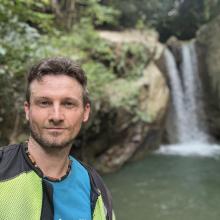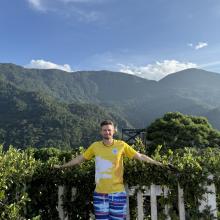Firth MacKenzie McEachern
Why did you decide to pursue a graduate degree?
With COVID's massive disruption to routine, I had considerable time to think of next steps. While teaching in Colombia and separated from my previous life in the Philippines, I decided to go back to university. Having worked, volunteered and advocated for 10 years for more flexible, diverse and inclusive language policies in education, graduate school offered the opportunity to accelerate learning, enhance my research and analytical skills, bridge the gap between academia and practice, expand my network and influence policymaking for the better.
Why did you decide to study at UBC?
I was attracted to UBC because it has one of the largest and most active education research departments in Canada, it is situated in a stunningly beautiful city and it brought me closer to family. I moved away from Canada when I was three years old, and it was time to reconnect.
What is it specifically, that your program offers, that attracted you?
UBC's Language & Literacy Education is a proponent of, and has strong connections with, Indigenous and immigrant communities; heritage and Indigenous language education; and multilingual equity, diversity and inclusion research.
What was the best surprise about UBC or life in Vancouver?
The breathtaking campus, the vast course offerings and the diversity of the graduate student body.
What aspect of your graduate program do you enjoy the most or are looking forward to with the greatest curiosity?
I enjoy the flexibility my department, professors and committee provide to create and pursue my own research inquiries.
What do you see as your biggest challenge(s) in your future career?
My life goal is a challenging one: to change government policies to allow, encourage and comprehensively support the use of historically, persistently or systemically marginalized (HPSM) languages, both here in Canada and abroad.
The technical skills gained from my program have already helped me obtain and successfully perform jobs in language and literacy-related projects in the international development sector, concurrent with my PhD, in the Philippines, Thailand, Myanmar, Palestine and Cambodia.
What aspects of your life or career before now have best prepared you for your UBC graduate program?
A quantitative-oriented undergraduate degree at Harvard and ten years of work experience in multilingual developing countries best prepared me for the PhD program. This experience has allowed me to blend quantitative and qualitative methodologies, along with theoretical and practical knowledge, to pursue research that tangibly facilitates my language and education advocacy. I have also had the privilege to serve as the President of the UBC Graduate Student Society, which has improved my skills with time, people and resources — all necessary for completing an extensive dissertation project in social sciences.
What do you like to do for fun or relaxation?
Surfing, snorkelling, scuba diving, hiking, camping, beach frisbee or soccer, Indian movie nights, dining with friends and dancing.
What advice do you have for new graduate students?
Don't jump immediately into a long research project without giving yourself time to think, learn and iterate. Don't be afraid to explore. Take some classes, teach, join smaller collaborative research projects or discussion groups as testing grounds, read widely, have conversations with professors, and attend seminars and a conference or two. And don't forget to take breaks and do fun activities with friends! Ideas will spark, and you will ultimately develop a PhD focus that is better conceptualized, feasible and aligned with your interest and skills. Take your time, and don't be ashamed of it.
Learn more about Firth MacKenzie's research
I study the effects of language of instruction policies on children and communities.



